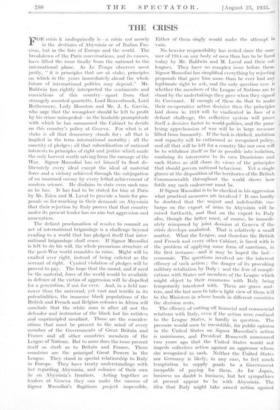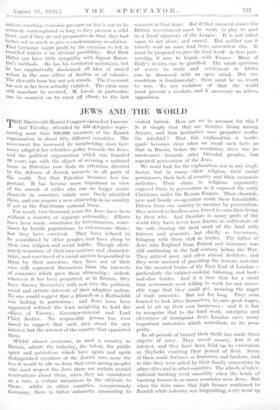THE CRISIS
FOR crisis it undisguisedly is--La crisis not merely in the destinies of Abyssinia or of Italian Fas- cism, but in the fate of Europe and the world. The breakdown of the Paris conversations, and its causes, have lifted the issue finally from the national to the international plane. As Le Temps observes most justly, " it is principles that are at stake, principles on which in the years immediately ahead the whole future of international politics may depend." Mr. Baldwin has rightly interpreted the sentiments and convictions of this country—apart from that strangely assorted quartette, Lord Beaverbrook, Lord Rothermere, Lady Houston and Mr. J. L. Garvin, who urge that the wrongdoer should be left to profit by. his crime unimpeded—in the laudable promptitude with which he has summoned the Cabinet to decide on this country's policy at Geneva. For what is at stake is all that democracy stands for ; all that is implied in the term international morality ; all the sanctity of pledges ; all that subordination of national interests to principles of right and justice which madc the only harvest worth salving from the carnage of the War. Signor Mussolini has set himself to flout de- liberately every ideal except the ideal of material force and a victory achieved through the subjugation of an unarmed enemy by every lethal achievement of modern science. He disdains to state even such case as he has. It has had to be stated for him at Paris by Mr. Eden and M. Laval to provide a basis for pro- posals so far-reaching in their demands on Abyssinia that their rejection by Italy proves that that country under its present leader has no aim but aggression and annexation.
The defiant proclamation of resolve to commit an act of international brigandage is a challenge beyond evading to a world that has pledged itself that inter- national brigandage shall cease. If Signor Mussolini is left to do his will, the whole precarious structure of the post-War world crumbles in ruins. Might will be exalted over right, instead of being enlisted as the servant of right. Cynical violation of pledges will be proved to pay. The hope that the moral, and if need be the material, force of the world would be available in defence of the victim of aggression will be dispelled for a generation, if not for ever. And, in a field nar- rower than the universal, yet vast and terrific in its potentialities, the immense black populations of the British and French and Belgian colonies in Africa will conclude that the white man is after all not the defender and instructor of the black but his ruthless and unprincipled assailant. Those are the consider- ations that must be present to the mind of every member of the Governments of Great Britain and France and all other countries members of the League of Nations. But to none does the issue present itself so stark as to Britain and France. Those countries are the principal Great Powers in the League. They stand in special relationship to Itidy in Europe. They have treaty 'understandings with her regarding Abyssinia, and colonies of their own lie on Abyssinia's frontiers. Acting together as leaders at Geneva they can make the success of Signor Mussolini's flagitious project impossible. Either of them singly would make the attempt in vain.
No heavier responsibility has rested since the sum- mer of 1914 on any body of men than has to be faced today by Mr. Baldwin and M. Laval and their col- leagues. They have no complex. issue before them. Signor Mussolini has simplified everything by rejecting proposals that gave him more than he ever had any legitimate right to ask, and the only question now is whether the members of the League of Nations are to stand by the undertakings they gave when they signed its Covenant. If enough of them do that to make their co-operative action decisive then the principles laid down in 1919 will be vindicated in face of a defiant challenge, the collective system will prove itself a decisive factor in world-politics, and the para- lysing apprehension of war will be in large measure lifted from humanity. If the task is shirked, ambition and rapacity will be enthroned as recognized policy, and all that will be left for a as like our own Will be to withdraw itself as far as possible into isolation, confining its intercourse to its own Dominions and such States as still share its views of the principles that should govern national behaviour. Yet a single glance at the disposition of the territories of the British Commonwealth throughout the world shows how futile any such endeavour must be.
If Signor Mussolini is to be checked in his aggression what practical measures are involved ? It can hardly be doubted that the unjust and indefensible em- bargo on the export of arms to Abyssinia will be raised forthwith, and that on the export to Italy also, though the latter must, of course, be immedi- ately reimposed by joint decision at GeneVa if the crisis develops unabated. .That is relatively a small matter. What the League, and therefore the British and French and every other Cabinet, is faced with is the problem of applying some form of sanctions, in the first instance—and it may be hoped the last— economic. The questions involved are the inherent efficacy of such action ; the danger of its provoking military retaliation by Italy ; and the fear of compli- cations with States not members of the League which might object to their commerce 'with Italy being temporarily interfered with. These are grave mat- ters, and the last men to take% light view of them will be the Ministers in whose hands in different countries the decision rests.
The efficacy of cutting off financial and commercial relations with Italy, even if the action were confined to the League States, is hardly in question. The pressure would soon be irresistible, for public opinion in the United States on Signor Mussolini's action is unanimous, and President Roosevelt announced two years ago that the United States would not impede collective action against an aggressor whom she recognized as such. Neither the United States nor Germany is likely, in any case; to feel much temptation to supply goods to a Government incapable of paying for them. As for Japan, business no doubt is business, but her sympathies at present appear to be with Abyssinia. The idea that Italy might take armed action against nations exerting economic pressure on her is not to be seriously contemplated so long as they present a solid front, and if they are not prepared to do that, they had better not so much as pass a condemnatory resolution. That Germany might profit by the occasion to fish in troubled waters is an obvious possibility. But Herr Hitler can have little sympathy with Signor Musso- lini's methods. He has his territorial ambitions, but he has emphatically disclaimed all idea of armed 'action in the case either of Austria or of colonies. The eleventh hour has not yet struck. The Covenant has not so far been actually violated. The crisis may still somehow be averted. M. Laval, in particular, can be counted on to exert all efforts to the last moment in that hope. But if that moment comes the British Government must be ready to play its part as a loyal signatory of the League. It is not called upon to act alone, and cannot. But neither can it tamely wait on some lead from somewhere else. It must be prepared to give the lead itself—in firm part- nership, it may be hoped, with France. Many of Italy's desires can be gratified. The whole question of access to trade and settlement in Africa can be discussed with an open mind. But one condition is fundamental : there must be no resort to war. To any violation of that the . world must present a resolute, and if necessary an active, opposition.



































 Previous page
Previous page